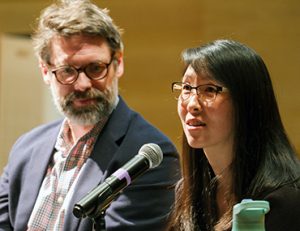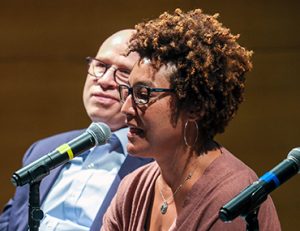On October 30, Bank Street alumni and students gathered on campus at the Tabas Auditorium for the 2024 Bank Street Dialogue: Education Today, an annual conversation that provides an opportunity for the community to engage in thoughtful dialogue about current issues and events and how the College is taking action to address them.
Hosted by the Bank Street College Alumni Association (BSCAA) and moderated by BSCAA president Margaret Ryan, GSE ’01, the Bank Street Dialogue featured a panel discussion with Shael Polakow-Suransky, GSE ’00, President; Emily Jones, Deputy Director, Bank Street Education Center: Culture, Race & Equity; Doug Knecht, Dean, Children’s Programs; and Dr. Soyoung Park, Director, Online Programs in Special Education.
The panel discussed the role of education in shaping civic discourse, emphasizing the need for innovative, creative, and self-reflective approaches, especially in the context of the 2024 presidential election. They spoke about navigating political discussions, addressing parental concerns, fostering emotional safety, addressing biases and ensuring equity, and addressing concerns about the future political climate. The panel provided useful guidance for building trust and open communication between teachers, parents, and school leadership to navigate sensitive political discussions in the classroom, including exploring ways to meaningfully create opportunities for students to practice democracy and civic engagement.
Polakow-Suransky began the conversation by outlining Bank Street College’s role, saying, “As an institution that prepares teachers and leaders and other educators, we have incredible power to shape the tools and capacities that educators bring to the table in their classrooms and impact hundreds and thousands of children over the course of their lives. It’s important to keep that in mind. It is an incredible power, and we must think hard about our particular instructional choices and practices. How to leverage those is something very much within our reach.”
 Park spoke about the challenge of creating opportunities for students to practice democracy and civic engagement at young ages. She said, “I think it’s unfair to expect that children will engage in civic discourse long term while our school systems continue to perpetuate inequities for children of color, disabled children, immigrant children, gender-expansive children. People whose populations feel vulnerable will continue to feel vulnerable, and that’s the work we have to do as educators, acknowledging that this is so much more than an election. These are issues that lie deep within our society. The fact that we don’t know how to love everybody despite our differences, that’s an existential problem we have as humanity.”
Park spoke about the challenge of creating opportunities for students to practice democracy and civic engagement at young ages. She said, “I think it’s unfair to expect that children will engage in civic discourse long term while our school systems continue to perpetuate inequities for children of color, disabled children, immigrant children, gender-expansive children. People whose populations feel vulnerable will continue to feel vulnerable, and that’s the work we have to do as educators, acknowledging that this is so much more than an election. These are issues that lie deep within our society. The fact that we don’t know how to love everybody despite our differences, that’s an existential problem we have as humanity.”
Jones spoke about providing time and space for educators to engage in self-reflection and build relationships with colleagues before addressing these topics with students. She said, “Sometimes the silence between us is also steeped in not wanting to threaten our  relationships, but when the relationships become more important than speaking about liberation and freedom, then we’ll have to push in a way that’s probably a little uncomfortable. You have to stop and you have to listen. When we allow that, then we can’t really unhear each other, right? I think that kids often want authentic conversations like adults want authentic conversations. It doesn’t mean that I’m never going to say something that might hurt your feelings. Part of learning how to engage in discourse is also knowing how to repair relationships. Sometimes it’s in that process of repairing where a lot of trust gets built.”
relationships, but when the relationships become more important than speaking about liberation and freedom, then we’ll have to push in a way that’s probably a little uncomfortable. You have to stop and you have to listen. When we allow that, then we can’t really unhear each other, right? I think that kids often want authentic conversations like adults want authentic conversations. It doesn’t mean that I’m never going to say something that might hurt your feelings. Part of learning how to engage in discourse is also knowing how to repair relationships. Sometimes it’s in that process of repairing where a lot of trust gets built.”
Knecht answered a question about the challenges of learning objectively about the electoral process while promoting respectful and productive discourse to students, saying “We’re not trying to tell children what to think. We’re really working to teach them how to think. At the same time, we are also curating what resources they digest and what questions we pose. What if people have a different perspective? How do we think about that? How would we have a conversation? But when it comes down to points that are being made or views that are being shared that feel like they transgress our values or express a viewpoint not holding somebody’s humanity as a value, we want to name that.”At the end of the discussion, alumni and guests asked questions and shared their experiences and reflections and concluded with a focus on the importance of ongoing discussions and planning to support students and educators in the coming months. Afterwards, a reception gave attendees a forum to meet each other and discuss what they heard.
Eric Gutiérrez, Alumni Relations Director, said, “We were thrilled to see so many people join us this year. After the discussion, faculty, alumni, and staff also spent time together at a reception that gave them the chance to connect with each other, discuss their thoughts, and enjoy our community.”